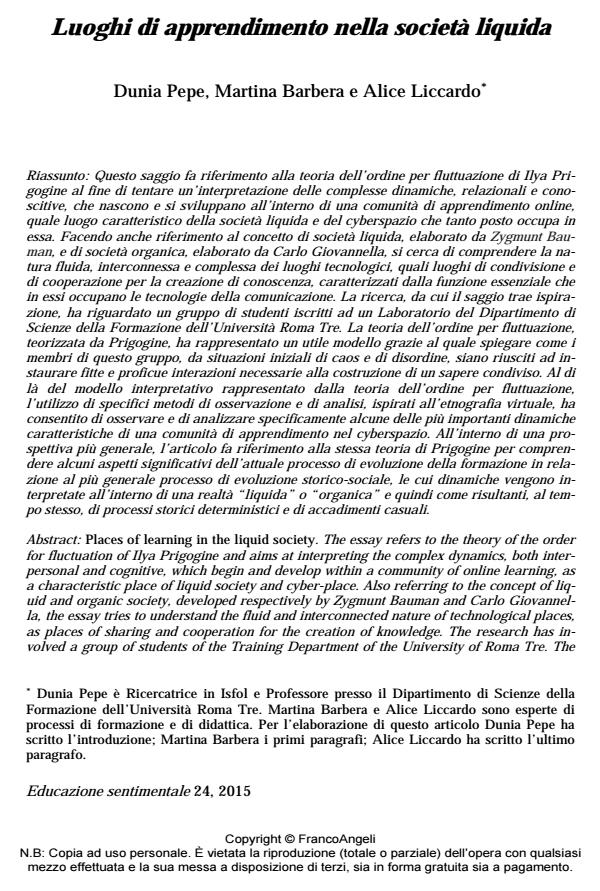Luoghi di apprendimento nella società liquida
Journal title EDUCAZIONE SENTIMENTALE
Author/s Dunia Pepe, Martina Barbera, Alice Liccardo
Publishing Year 2015 Issue 2015/24
Language Italian Pages 11 P. 161-171 File size 79 KB
DOI 10.3280/EDS2015-024011
DOI is like a bar code for intellectual property: to have more infomation
click here
Below, you can see the article first page
If you want to buy this article in PDF format, you can do it, following the instructions to buy download credits

FrancoAngeli is member of Publishers International Linking Association, Inc (PILA), a not-for-profit association which run the CrossRef service enabling links to and from online scholarly content.
Places of learning in the liquid society. The essay refers to the theory of the order for fluctuation of Ilya Prigogine and aims at interpreting the complex dynamics, both interpersonal and cognitive, which begin and develop within a community of online learning, as a characteristic place of liquid society and cyber-place. Also referring to the concept of liquid and organic society, developed respectively by Zygmunt Bauman and Carlo Giovannella, the essay tries to understand the fluid and interconnected nature of technological places, as places of sharing and cooperation for the creation of knowledge. The research has involved a group of students of the Training Department of the University of Roma Tre. The theory of the order for fluctuation, developed by Prigogine represented a useful model with which to explain how the members of this group, from initial situations of chaos and disorder, have managed to establish fruitful interaction, necessary for the construction of a shared knowledge. The use of specific methods of observation and analysis has allowed us to observe and analyze some of the most significant dynamic characteristics of a learning community in cyber-space. Within a more general perspective, the article refers to the same theory of P. to understand some important aspects of training development in relation to the more general process of social-historical evolution, the dynamics of which are interpreted within a liquid or organic reality as a result of historical processes and casual events .
Keywords: Organic society, lifelong learning, web, virtual community, communication, shared knowledge, order for fluctuation, autopoiesis, learning
Dunia Pepe, Martina Barbera, Alice Liccardo, Luoghi di apprendimento nella società liquida in "EDUCAZIONE SENTIMENTALE" 24/2015, pp 161-171, DOI: 10.3280/EDS2015-024011